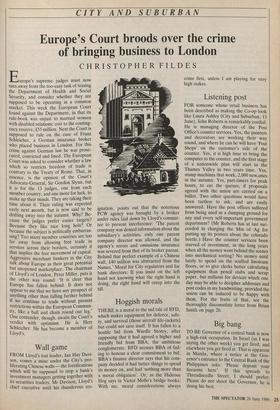CITY AND SUBURBAN
Europe's Court broods over the crime of bringing business to London
CHRISTOPHER FILDES
Europe's supreme judges must now turn away from the too-easy task of teasing the Department of Health and Social Security, and consider whether they are supposed to be operating in a common market. This week the European Court found against the Department, in that its rule-book was unjust to married women with disabled relations: cost to the conting- ency reserve, £55 million. Next the Court is supposed to rule on the case of Franz Schleicher, a German insurance broker who placed business in London. For this crime against German law he was prose- cuted, convicted and fined. The European Court was asked to consider whether a law which so restricts freedom of trade is contrary to the Treaty of Rome. That, in essence, is the opinion of the Court's Advocate-General, Sir Gordon Slynn, but it is for the 13 judges, one from each member country, and one more for luck, to make up their minds. They are taking their time about it. Their ruling was expected early next month, but is now said to be drifting away into the autumn. Why? Be- cause the judges prefer easier targets? Because they like nice long hols? Or because the subject is politically embarras- sing? Too many member countries are too far away from allowing free trade in services across their borders, certainly if that implies the free movement of capital. Aggressive merchant bankers in the City talk about Europe as their great potential but unopened marketplace. The chairman of Lloyd's of London, Peter Miller, puts it the other way round: 'It is clear that Europe has fallen behind. It does not appear to me that we have any prospect of anything other than falling further behind if we continue to trade without present restrictions within the European Commun- ity, like a ball and chain round our leg.' One contender, though, awaits the Court's verdict with optimism. He is Herr Schleicher. He has become a member of Lloyd's.


















































 Previous page
Previous page